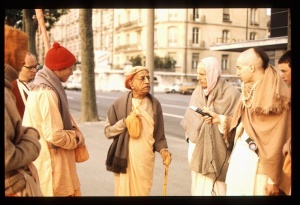SB 5.26.30: Difference between revisions
m (1 revision(s)) |
No edit summary |
||
| Line 1: | Line 1: | ||
{{info | {{info | ||
|speaker= | |speaker=Śukadeva Gosvāmī | ||
|listener=King | |listener=King Parīkṣit | ||
}} | }} | ||
[[Category:Srimad-Bhagavatam - Canto 05 Chapter 26]] | |||
[[Category:Bhagavatam Verses Spoken by Sukadeva Gosvami - Vanisource|052630]] | |||
<div style="float:left">'''[[Srimad-Bhagavatam]] - [[SB 5|Fifth Canto]] - [[SB 5.26: A Description of the Hellish Planets|Chapter 26: A Description of the Hellish Planets]]'''</div> | |||
<div style="float:right">[[File:Go-previous.png|link=SB 5.26.29]] '''[[SB 5.26.29]] - [[SB 5.26.31]]''' [[File:Go-next.png|link=SB 5.26.31]]</div> | |||
{{RandomImage}} | |||
==== TEXT 30 ==== | ==== TEXT 30 ==== | ||
<div | <div class="verse"> | ||
atha ca yas tv iha vā ātma-sambhāvanena svayam adhamo janma-tapo-vidyācāra-varṇāśramavato varīyaso na bahu manyeta sa mṛtaka eva mṛtvā kṣārakardame niraye 'vāk-śirā nipātito durantā yātanā hy aśnute | :atha ca yas tv iha vā ātma-sambhāvanena svayam adhamo | ||
:janma-tapo-vidyācāra-varṇāśramavato varīyaso | |||
:na bahu manyeta sa mṛtaka eva mṛtvā kṣārakardame | |||
:niraye 'vāk-śirā nipātito durantā yātanā hy aśnute | |||
</div> | </div> | ||
| Line 13: | Line 22: | ||
==== SYNONYMS ==== | ==== SYNONYMS ==== | ||
<div | <div class="synonyms"> | ||
''atha''—furthermore; ''ca''—also; ''yaḥ''—anyone who; ''tu''—but; ''iha''—in this life; ''vā''—or; ''ātma-sambhāvanena''—by false prestige; ''svayam''—himself; ''adhamaḥ''—very degraded; ''janma''—good birth; ''tapaḥ''—austerities; ''vidyā''—knowledge; ''ācāra''—good behavior; ''varṇa-āśrama-vataḥ''—in terms of strictly following the principles of varṇāśrama; ''varīyasaḥ''—of one who is more honorable; ''na''—not; ''bahu''—much; ''manyeta''—respects; ''saḥ''—he; ''mṛtakaḥ''—a dead body; ''eva''—only; ''mṛtvā''—after dying; ''kṣārakardame''—named Kṣārakardama; ''niraye''—in the hell; ''avāk-śirā''—with his head downward; ''nipātitaḥ''—thrown; ''durantāḥ yātanāḥ''—severe painful conditions; ''hi''—indeed; ''aśnute''—suffers. | |||
</div> | </div> | ||
| Line 20: | Line 29: | ||
==== TRANSLATION ==== | ==== TRANSLATION ==== | ||
<div | <div class="translation"> | ||
A lowborn and abominable person who in this life becomes falsely proud, thinking "I am great," and who thus fails to show proper respect to one more elevated than he by birth, austerity, education, behavior, caste or spiritual order, is like a dead man even in this lifetime, and after death he is thrown headfirst into the hell known as Kṣārakardama. There he must great suffer great tribulation at the hands of the agents of Yamarāja. | A lowborn and abominable person who in this life becomes falsely proud, thinking "I am great," and who thus fails to show proper respect to one more elevated than he by birth, austerity, education, behavior, caste or spiritual order, is like a dead man even in this lifetime, and after death he is thrown headfirst into the hell known as Kṣārakardama. There he must great suffer great tribulation at the hands of the agents of Yamarāja. | ||
</div> | </div> | ||
| Line 27: | Line 36: | ||
==== PURPORT ==== | ==== PURPORT ==== | ||
<div | <div class="purport"> | ||
One should not become falsely proud. One must be respectful toward a person more elevated than he by birth, education, behavior, caste or spiritual order. If one does not show respect to such highly elevated persons but indulges in false pride, he receives punishment in Kṣārakardama. | One should not become falsely proud. One must be respectful toward a person more elevated than he by birth, education, behavior, caste or spiritual order. If one does not show respect to such highly elevated persons but indulges in false pride, he receives punishment in ''Kṣārakardama''. | ||
</div> | </div> | ||
__NOTOC__ | |||
<div style="float:right; clear:both;">[[File:Go-previous.png|link=SB 5.26.29]] '''[[SB 5.26.29]] - [[SB 5.26.31]]''' [[File:Go-next.png|link=SB 5.26.31]]</div> | |||
__NOTOC__ | |||
__NOEDITSECTION__ | |||
Revision as of 16:15, 7 June 2021

A.C. Bhaktivedanta Swami Prabhupada
TEXT 30
- atha ca yas tv iha vā ātma-sambhāvanena svayam adhamo
- janma-tapo-vidyācāra-varṇāśramavato varīyaso
- na bahu manyeta sa mṛtaka eva mṛtvā kṣārakardame
- niraye 'vāk-śirā nipātito durantā yātanā hy aśnute
SYNONYMS
atha—furthermore; ca—also; yaḥ—anyone who; tu—but; iha—in this life; vā—or; ātma-sambhāvanena—by false prestige; svayam—himself; adhamaḥ—very degraded; janma—good birth; tapaḥ—austerities; vidyā—knowledge; ācāra—good behavior; varṇa-āśrama-vataḥ—in terms of strictly following the principles of varṇāśrama; varīyasaḥ—of one who is more honorable; na—not; bahu—much; manyeta—respects; saḥ—he; mṛtakaḥ—a dead body; eva—only; mṛtvā—after dying; kṣārakardame—named Kṣārakardama; niraye—in the hell; avāk-śirā—with his head downward; nipātitaḥ—thrown; durantāḥ yātanāḥ—severe painful conditions; hi—indeed; aśnute—suffers.
TRANSLATION
A lowborn and abominable person who in this life becomes falsely proud, thinking "I am great," and who thus fails to show proper respect to one more elevated than he by birth, austerity, education, behavior, caste or spiritual order, is like a dead man even in this lifetime, and after death he is thrown headfirst into the hell known as Kṣārakardama. There he must great suffer great tribulation at the hands of the agents of Yamarāja.
PURPORT
One should not become falsely proud. One must be respectful toward a person more elevated than he by birth, education, behavior, caste or spiritual order. If one does not show respect to such highly elevated persons but indulges in false pride, he receives punishment in Kṣārakardama.